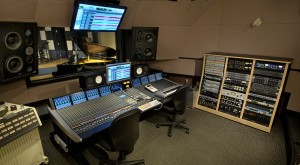For centuries people have sought to improve methods of communication. Through means as varied as dance, writing, and broadcasting, our basic need to communicate keeps us entertained, informed, and connected to one another and the world around us. Although the field of arts, audio-video technology, and communication offers career opportunities that range from playwright to audio engineer, they all share one thing in common: a desire to improve our understanding of one another through communication.

Arts, Audio-video Technology, and Communication
Careers in visual arts, performing arts, and areas of journalism, broadcasting, and film call for strong creative talents. Workers in these areas must be able to invent or work with a concept or idea and convey it to a wide audience in a clear and understandable way. On the other hand, people who work in audio and video technology, printing, and telecommunications need to have the strong technical (math and science) skills that keep these systems running.
Arts, Audio-video Technology, and Communication Career Pathways
There are six career pathways in this cluster: audio-video technology and film, journalism and broadcasting, performing arts, printing technology, telecommunications, and visual arts.
Audio-Video Technology and Film Career Path
People in this area work with equipment that transmits audio and video images to people through television, film, radio, and other means of communication. Workers in this area can design, install, repair, or monitor the use of such equipment in film and television studios, businesses, concert venues and stadiums, and many other settings. Careers in audio-video technology and film include audio engineers, electronics service technicians, and multimedia sound workers.
Journalism and Broadcasting Career Path
Working from a story idea that they are either assigned or come up with themselves, journalists gather information on the topic from various sources, check and verify all of their facts, and write stories for print, radio, television, or online release. Broadcast workers purchase, install, test, and operate the equipment that makes television, radio, film, and Web broadcasts happen. Jobs in this category include audio recording engineers, broadcast engineers, news anchors, newspaper editors, and radio and television program directors.
Performing Arts Career Path
This category includes all of the careers that make films, plays, and music and dance performances a reality. This includes the production companies that plan the events, the agents that hire talent, the performers themselves, and the technicians that create the lighting, makeup, and costumes that a performance requires. Careers in this area include actors, costume designers, music agents and scouts, and music conductors and directors.
Printing Technology Career Path
Careers in this area deal with the creation of books, magazines, and newspapers from raw manuscript or electronic files to printed pages. The three main areas in this field are prepress (workers who prepare material for printing), press (workers who monitor and operate printing presses), and postpress/binding (workers who check the quality of printed products and assemble pages into the final product). Careers in printing technology include desktop publishing specialists, graphic designers, prepress workers, and printing press operators.
Telecommunications Career Path
Workers in this area install, monitor, and repair the equipment that transmits audio and video data across communication lines. This equipment is controlled by computer systems and is very sensitive in nature. Thus telecommunications work requires a high degree of technical knowledge. Careers in this area include communications equipment technicians, fiber optics technicians, and telecommunications technicians.
Visual Arts Career Path
Careers in the visual arts fall into two broad categories. Fine artists express their own thoughts and emotions through a variety of media and methods, such as painting, sculpture, and drawing. Commercial artists, such as illustrators and graphic designers, use their creative talents to create packaging, logos, annual reports, and other projects for corporate and individual clients. Careers in this category include artists, cartoonists and animators, fashion designers, interior designers and decorators, and medical illustrators and photographers.
Exploring Arts, Audio-video Technology, and Communication
Most jobs in the arts and communications field require at least an associate’s degree, but many (such as journalists and broadcast engineers) require a bachelor’s degree or higher, especially for upper-level and supervisory positions. For example, many community colleges offer two-year associate’s degree programs in printing technology that would enable you to get an entry-level position in the field, but combining this degree with an internship and advanced coursework in desktop design or business management would provide more opportunities for advancement. Although it is possible to pursue a career in the performing arts, such as acting, without an advanced degree, most people in the field have some sort of formal training or a bachelor’s degree in fine arts, which can provide increased opportunities within and outside of the field.
Although the jobs in this field are varied, they all require excellent communication skills and an appreciation for how messages are received by various audiences. If you are interested in this field, become involved with clubs and activities such as your school newspaper, yearbook, drama club, or audio-visual club. Not only will you acquire some of the technical and performance skills this field requires, but you will learn the value of teamwork and group decision-making, which are also important aspects of this field.
Arts, Audio-video Technology, and Communication Careers Outlook
The arts and communications industry is one of the most popular fields—and therefore one of the most competitive. Employment growth in the radio and television broadcasting and newspaper industries should be slower than the average through 2016, according to the U.S. Department of Labor. Major broadcasters and newspapers have consolidated in recent years to cut costs, thereby creating fewer new jobs. Working in a smaller market to gain experience is a good idea; most larger markets, such as Chicago and New York, prefer to hire experienced workers. Employment in the visual arts and printing industries should be a bit better, as changes in technology will create positions for workers with the right blend of technical and creative skill.
Return to Career Clusters list.